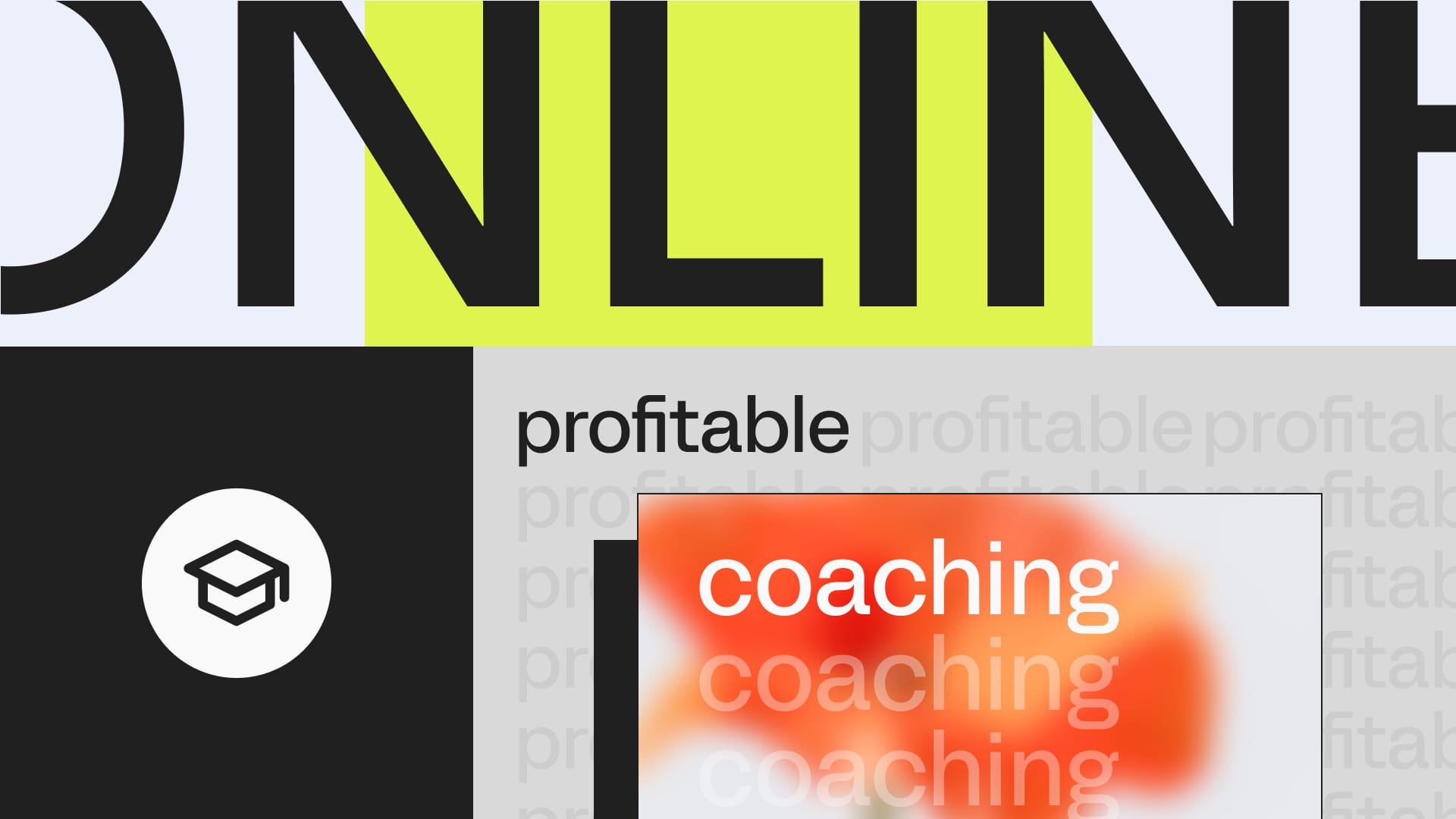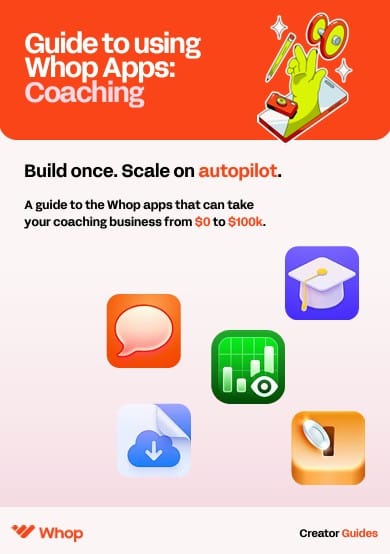To start an online coaching business, define your unique selling point, identify your target audience, create your program, set a pricing strategy, find a platform to sell on (like Whop), build your business, and start marketing it.
Key takeaways
- Start an online coaching business in 8 steps: define your USP, identify target clients, create your program, set pricing, and launch.
- Group coaching offers better scalability and income potential than 1:1 coaching while building community among students.
- A compelling unique selling point differentiates your coaching business and justifies premium pricing in competitive markets.
Starting an online coaching business takes just 8 steps: finding your offer's unique selling point, identifying your target audience, creating your program content, setting pricing strategy, choose a platform like Whop, build your business, and market it.
The Whop coaching app stack: PDF guide
I studied 50 coaching offers on Whop earning over $100,000 per month. These are apps you need to print money.
The global e-learning market is predicted to grow to $354+ billion in 2025, and there's plenty of money to be made across every niche.
In this guide, we'll walk you through 8 steps to launch, grow, and monetize your online coaching business, from defining your niche to setting up a hub where clients can book, pay, and learn.
How to start an online coaching business in 8 steps
If you want to start an online coaching business, the process can seem overwhelming at first.
From defining your niche to attracting coaching clients, there are a lot of moving parts.
Here's a practical, step-by-step guide to launching a profitable online coaching business.
1. Figure out your unique selling point
Your USP (unique selling point) is what sets your coaching business apart from others in your niche.
Think about your expertise, skills, and tools: what can you offer that no one else does?
"Try to go beyond generic markets and create coaching offers for specific problems people are actively looking for solutions to."
- Iman Gadzhi, Whop Co-Owner
Even in competitive markets, a well-communicated USP can attract clients. For example, if you specialize in fitness coaching using the latest AI tracking tools, highlight that.
If you're a career coach with unique industry experience, showcase your achievements. Your USP will also influence pricing, marketing, and how you structure your online coaching programs.
Get inspired with these 35 coaching niches
2. Identify your ideal clients
Who will benefit most from your online coaching? Your target audience informs everything from your pricing to your marketing strategy.
Start by analyzing your niche. If you coach day trading, for example, your audience could range from teenagers to retirees – but your messaging, tools, and style will differ for each group.
"College kids can make heaps of money showing the older generation how to use technology. You don't need to be an expert— you just need to be a few steps ahead."
— Online tech coach
Create target personas to clarify: age, experience level, preferred learning format, and pain points.
How to create your target persona
3. Creating a coaching program
A clear, goal-oriented coaching program is essential for success. Break your program into milestones or modules, and make sure each lesson has a defined outcome.
Test and iterate: the first cohort of students will help you identify gaps or areas for improvement.
Collect feedback, analyze completion rates, and refine your course structure. A structured online coaching program makes learning predictable, measurable, and rewarding for students.
4. Set your pricing strategy
Online coaching pricing is more than a number; it communicates value.
Research competitors and understand what your target audience is willing to pay.
If your USP is highly compelling or unique, you can justify premium pricing. In competitive niches, you may need to price more strategically to attract initial coaching clients.
"Whop Payments gives you the ability to create financing options, like buy now, pay later.
Clients can make 12 monthly payments through Klarna, Afterpay, Splitit, and more options. You still get paid the whole amount upfront."
- Brett Malinowski, YouTuber and Head of Marketing at Whop
Consider recurring payment models, one-off sessions, or subscription access to on-demand coaching content.
How to price digital products and services: strategies and models used by the experts
5. Find the best platform to sell on
A reliable online coaching platform streamlines your coaching business. Look for one that allows you to:
- Build landing pages and digital storefronts
- Process payments securely
- Host live or on-demand coaching sessions
- Manage clients and deliver content
Top coaching platforms eliminate the need for multiple tools or complex setups. They also save time, reduce tech headaches, and help you maintain a professional image from day one.
When you coach with Whop, we take care of all payment processing and fulfillment.
Here are the best online coaching platforms to get you started.
6. Build your coaching business
Now it's time to go live. Set up your online coaching business with clear branding, imagery, and messaging that reinforce your USP.
Add SEO-friendly copy to your landing page or course descriptions to attract organic traffic. Ensure payment methods are active, and double-check that coaching clients can sign up seamlessly.
By having a professional, fully functional setup, you reduce friction and improve conversions from the very first student.
7. Create your marketing funnel
With your coaching program live, your next priority is attracting and converting clients. Use a mix of channels to create a marketing funnel that aligns with your niche:
- Social media: Instagram, YouTube, Twitter, LinkedIn, or niche forums
- Content marketing: blog posts, video tutorials, email newsletters
- Paid ads: social ads or Google Ads (with a clear ROI plan)
Incorporate social proof by featuring reviews and testimonials from early students. An optimized funnel ensures that interested prospects move smoothly from awareness to signup.
8. Start coaching!
It's time to begin online coaching! Deliver your sessions, monitor student progress, and solicit feedback.
Continuous improvement is key to retaining coaching clients and building a strong reputation.
Encourage students to leave reviews or testimonials, and consider creating an email list or online community for long-term engagement.
This not only supports your existing clients but also provides a ready audience for future courses or products.
Why become an online coach?
Online coaching lets you build a profitable business while helping people, without the limitations of traditional, in-person coaching.
Here's a few more reasons why starting an online coaching business makes sense:
Benefits of online coaching for entrepreneurs
- Global reach: Your clients aren't limited to your city (or your country). Anyone with an internet connection can find you, expanding your potential audience exponentially. You can coach from home, a café, or even a beach.
- Flexibility: Set your own schedule. Unlike in-person coaching, online coaching sessions let you choose the hours that work for you and your clients: early mornings, evenings, or weekends (you decide).
- Low startup costs: Forget renting office space or investing in equipment. All you need is a computer and a reliable internet connection to start an online coaching business.
- Scalability: Online coaching platforms make it easy to coach larger groups, offer workshops, or create on-demand courses. Record once, sell repeatedly – passive income becomes possible.
- Versatile: Beyond coaching sessions, you can build online communities, host group discussions, and deliver resources digitally. Students get connection and engagement, even from a distance.
- Data-driven growth: Online coaching platforms like Whop let you track client progress, optimize your marketing, and make smarter business decisions. Analytics and advertising are built in, giving you insights to grow faster.
Why online coaching is profitable
Online coaching is an easy business with low overheads, limited barriers to entry (basically none), and it suits people with all kinds of skills.
"The best product you can sell digitally is some sort of coaching or membership offer on something you're really passionate about or knowledgeable in."
- Diego Monroy from Whop
The keys to a successful online coaching business
Before launching your coaching business online, focus on what separates successful online coaches from the rest:
Essential skills for online coaches:
- Expertise: You need real knowledge or skill in your area. You don't need a PhD, but your online coaching should provide tangible value that students can't easily get elsewhere.
"Don't spend seven years becoming an expert. In 3-4 weeks, if you create a specific mechanism to solve someone's problem, you can start coaching people."
- Iman Gadzhi, Whop Co-Owner
- People skills: Being an expert isn't enough, you gotta be able to teach effectively. Good communication, listening, and adapting to your students' needs are essential skills you can learn over time.
- Clear value proposition: Students should immediately understand why they should learn from you. Make your offering obvious and appealing.
Building your online coaching brand:
- Niche focus: Pick an area in demand and aligned with your expertise, like fitness or sales. A clear niche helps with pricing, marketing, and establishing authority in your coaching business.
- Customer acquisition: Plan how you'll attract students. Social media, YouTube demos, newsletters, or niche communities are all ways to showcase your skills and drive interest.
- Social proof: Collect testimonials and reviews from early students. Positive feedback builds trust and persuades new coaching clients to sign up.
Growing your online coaching business:
- Finding a scaling strategy: Once you have traction, explore group coaching, on-demand courses, ebooks, or even hiring other coaches. These strategies increase revenue and free up your time.
Alexis is one of Whop's top-earning coaches. Watch her video below for advice on scaling your coaching business:
Group vs. individual coaching: Which is best?
When starting an online coaching business, one of the biggest decisions is whether to offer one-on-one coaching or group coaching.
Both online coaching approaches have unique advantages depending on your goals, niche, and audience:
Individual coaching
1:1 online coaching is ideal if you want to provide highly personalized guidance. Your students get your full attention, and you can tailor lessons to their specific needs. This can lead to higher perceived value, allowing you to charge premium prices.
The downside? Your growth and revenue are capped by the number of hours in your day.
Serving a small number of students limits scalability, and you may need to rely on high-ticket pricing to make it profitable.
Group coaching
Group coaching allows you to reach multiple clients at once, scaling your impact and income.
Charging less per person often makes your coaching program more accessible, attracting a larger audience, and coaching more participants also means more reviews, testimonials, and word-of-mouth promotion.
Plus, your students can connect with one another, discuss challenges, and support each other, which is harder to achieve in individual coaching.
Over time, these interactions can evolve into online communities that extend the value of your program.
"Group coaching is the most popular among creators on Whop, and the ones who make the most money typically charge anywhere from $3,000 to $10,000."
- Brett Malinowski, Head of Marketing at Whop
Which coaching method should you choose?
Group coaching tends to offer better scalability, community building, and long-term growth potential.
That said, individual coaching still has a place, especially as a high-ticket offering or a complement to group sessions.
Many successful online coaches use a hybrid model, providing group coaching as their main offering and individual coaching for premium clients.
Launch your online coaching career with Whop
Whop isn’t just a place to host your coaching, it’s an all-in-one hub for creator growth:
- Scale into courses: Upload on-demand lessons, drip content, and create structured programs for thousands of students.
- Build communities: Run forums, gated content, and interactive group coaching sessions to foster loyal followings.
- Host live sessions: Stream webinars, workshops, and Q&As without juggling multiple tools.
- Sell downloads and digital products: Offer ebooks, templates, or exclusive content to expand your revenue streams.
Whop also acts as your Merchant of Record and payment processor, so handling payments, taxes, and global transactions is completely seamless.
Start your coaching business on Whop today and turn your expertise into a profitable, scalable, all-in-one operation.
FAQs
What are the advantages of online coaching?
One of the biggest advantages of online coaching is that you can do it from anywhere and at any time, and the same sort of flexibility applies to your students, too.
It doesn’t cost much to get into, and there’s plenty of potential in the business model if you do it right.
Is group coaching better than individual coaching?
Generally, yes, at least in terms of potential for scaling a business and developing revenue streams such as additional digital products and premium communities.
However, individual coaching does have its merits, and some students will pay top dollar for that personalized experience.
How to scale an online coaching business?
It’s always a good idea to build an online community and keep your students engaged, and this becomes a ready-made market for additional products, be it on-demand courses or follow-up coaching sessions.




